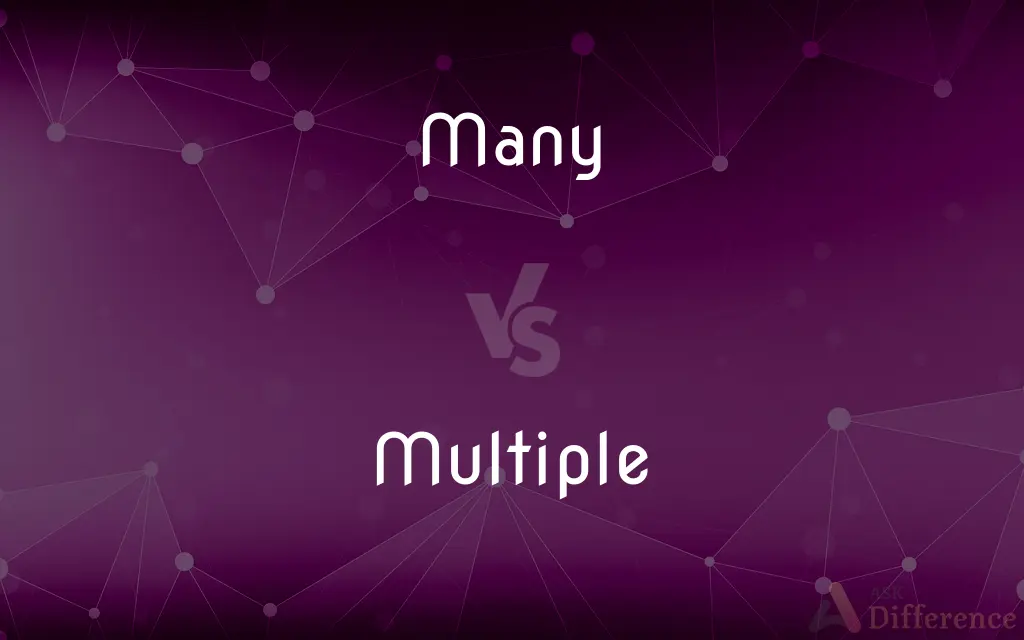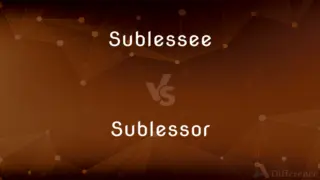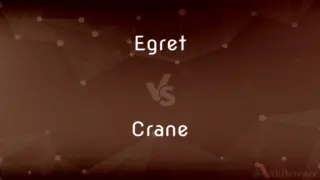Many vs. Multiple — What's the Difference?
Edited by Tayyaba Rehman — By Fiza Rafique — Updated on October 29, 2023
"Many" denotes a large number of items or people; "Multiple" refers to several individual or separate items, often of the same kind.

Difference Between Many and Multiple
Table of Contents
ADVERTISEMENT
Key Differences
"Many" is an adjective used to denote a large quantity of something, emphasizing the number. On the other hand, "Multiple" indicates that there are several distinct units or items, often emphasizing variety or different instances.
When using "Many," the focus is on the sheer number of items or people. For instance, "many books" simply means a large number of books. Conversely, "Multiple" brings attention to the individuality or separateness of items. "Multiple books" can imply several different titles or editions.
It's also worth noting that "Many" is specifically quantitative, while "Multiple" can also indicate variety. For instance, "many flavors" suggests a large number of flavors, but "multiple flavors" suggests several distinct types.
In some contexts, both "Many" and "Multiple" can be used interchangeably without much difference in meaning. However, it's essential to recognize the subtle distinctions between them, particularly when precision in language is required.
Comparison Chart
Grammatical Category
Adjective
Adjective
ADVERTISEMENT
Focus
Quantity
Variety or distinctness
Usage with Numbers
Not typically paired with specific numbers.
Often paired with numbers (e.g., multiple times).
Implies Distinctness
No
Yes
Common Contexts
Many people, many problems.
Multiple choices, multiple solutions.
Compare with Definitions
Many
Referring to a large number.
Many students attended the seminar.
Multiple
Several distinct units.
The test had multiple sections.
Many
Quantitative term for abundance.
She has read many novels this year.
Multiple
Relating to or involving several entities.
The project has multiple stakeholders.
Many
Countable items in excess.
There are many reasons to be happy.
Multiple
More than one of a kind.
She has multiple pairs of shoes.
Many
The opposite of few.
There were many days of sunshine.
Multiple
Varied or diverse.
He has multiple talents.
Many
A significant proportion of a whole.
Many of the participants agreed.
Multiple
Numerous times or occurrences.
She visited him multiple times.
Many
Amounting to or consisting of a large indefinite number
Many friends.
Multiple
Having, relating to, or consisting of more than one individual, element, part, or other component; manifold.
Many
Being one of a large indefinite number; numerous
Many a child.
Many another day.
Multiple
A number that may be divided by another number with no remainder
4, 6, and 12 are multiples of 2.
Many
The majority of the people; the masses
"The many fail, the one succeeds" (Tennyson).
Multiple
More than one (followed by plural).
My Swiss Army knife has multiple blades.
Many
A large indefinite number
A good many of the workers had the flu.
Multiple
Having more than one element, part, component, or function, having more than one instance, occurring more than once, usually contrary to expectations (can be followed by a singular).
Some states do explicitly prohibit multiple citizenship.
It was a multiple pregnancy: the woman had triplets.
Multiple registrations are an increasing problem for many social networking sites.
Many
An indefinite large number of.
Not many such people enjoyed playing chess.
There are very many different ways to cook a meal.
Multiple
(mathematics) A whole number that can be divided by another number with no remainder.
Many
(in combinations such as 'as many', 'so many', 'this many') Used to indicate, demonstrate or compare the number of people or things.
We don't need this many bananas. Put some back.
There may be as many as ten million species of insect.
I don't have as many friends as my sister does.
Multiple
(finance) Price-earnings ratio.
Many
An indefinite large number of people or things.
Many are called, but few are chosen.
Multiple
One of a set of the same thing; a duplicate.
Many
A multitude; a great aggregate; a mass of people; the generality; the common herd.
Democracy must balance the rights of the few against the will of the many.
Multiple
A single individual who has multiple personalities.
Many
A considerable number.
Multiple
One of a set of siblings produced by a multiple birth.
Many
Existing in large number; numerous.
Multiple
A chain store.
Many
A retinue of servants; a household.
Multiple
A discovery resulting from the work of many people throughout history, not merely the work of the person who makes the final connection.
Many
The populace; the common people; the majority of people, or of a community.
After him the rascal many ran.
Multiple
More than one piercing in a single ear.
Many
A large or considerable number.
A many of our bodies shall no doubtFind native graves.
Seeing a great many in rich gowns.
It will be concluded by many that he lived like an honest man.
He is liable to a great many inconveniences.
Multiple
Containing more than once, or more than one; consisting of more than one; manifold; repeated many times; having several, or many, parts.
Many
Consisting of a great number; numerous; not few.
Thou shalt be a father of many nations.
Not many wise men after the flesh, not many mighty, not many noble, are called.
Multiple
A quantity containing another quantity an integral number of times without a remainder.
Many
A quantifier that can be used with count nouns and is often preceded by `as' or `too' or `so' or `that'; amounting to a large but indefinite number;
Many temptations
The temptations are many
A good many
A great many
Many directions
Take as many apples as you like
Too many clouds to see
Never saw so many people
Multiple
The product of a quantity by an integer;
36 is a multiple of 9
Multiple
Having or involving or consisting of more than one part or entity or individual;
Multiple birth
Multiple ownership
Made multiple copies of the speech
His multiple achievements in public life
Her multiple personalities
A pineapple is a multiple fruit
Common Curiosities
Does "Many" imply variety?
Not necessarily. "Many" mainly focuses on quantity.
Is "Many" always used with countable nouns?
Yes, "Many" is typically used with countable nouns.
Can "Multiple" be used without specifying the number?
Yes, it can be used to indicate more than one without specifying how many.
Can "Multiple" be used with uncountable nouns?
It's less common. "Multiple" is usually paired with countable entities.
Can you use "Many" to describe distinct categories?
While "Many" focuses on quantity, it doesn't inherently imply distinct categories.
How is "Multiple" different from "Several"?
Both indicate more than one, but "Multiple" emphasizes distinct units, while "Several" emphasizes an unspecified but limited number.
Can "Many" and "Multiple" be used interchangeably?
Sometimes, but not always. They have subtle distinctions in focus.
Is "Many" used with specific numbers?
Rarely. "Many" generally implies an unspecified large quantity.
Which is more general, "Many" or "Multiple"?
"Many" is more general in terms of quantity, while "Multiple" emphasizes individuality or variety.
Does "Multiple" always suggest distinct types?
Often, but not necessarily. It mainly emphasizes more than one.
Is "Multiple" more formal than "Many"?
Not necessarily, but "Multiple" may appear more in technical or specific contexts.
How do you decide whether to use "Many" or "Multiple"?
Consider whether you're emphasizing quantity (many) or distinctness/multiplicity (multiple).
What's the plural form of "Multiple"?
"Multiples", as in "multiples of ten".
Can you say "Many multiples"?
Yes, it would mean a large number of distinct units or types.
Does "Many" always indicate a majority?
No, it indicates a large number but not necessarily a majority.
Share Your Discovery

Previous Comparison
Sublessee vs. Sublessor
Next Comparison
Egret vs. CraneAuthor Spotlight
Written by
Fiza RafiqueFiza Rafique is a skilled content writer at AskDifference.com, where she meticulously refines and enhances written pieces. Drawing from her vast editorial expertise, Fiza ensures clarity, accuracy, and precision in every article. Passionate about language, she continually seeks to elevate the quality of content for readers worldwide.
Edited by
Tayyaba RehmanTayyaba Rehman is a distinguished writer, currently serving as a primary contributor to askdifference.com. As a researcher in semantics and etymology, Tayyaba's passion for the complexity of languages and their distinctions has found a perfect home on the platform. Tayyaba delves into the intricacies of language, distinguishing between commonly confused words and phrases, thereby providing clarity for readers worldwide.















































